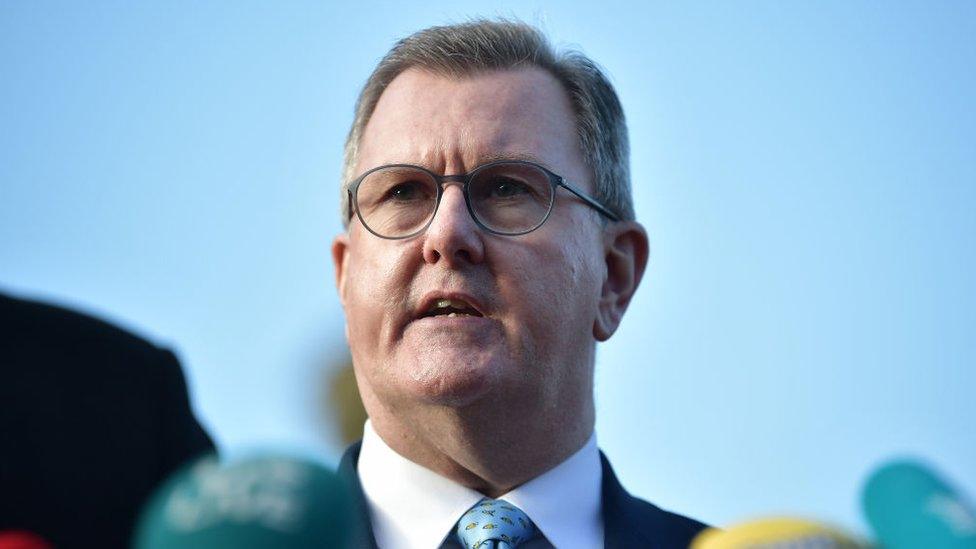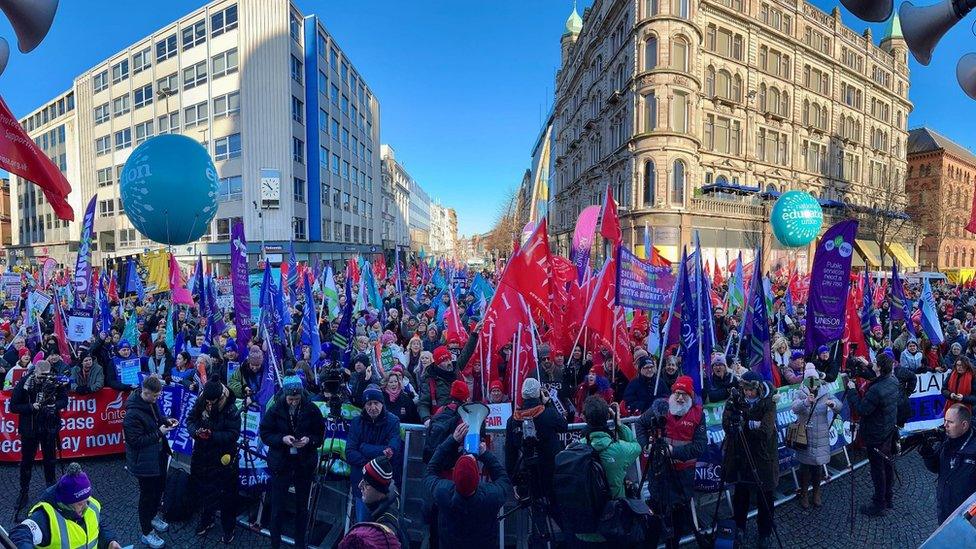Stormont crisis: DUP meets but officers make no decision
- Published
- comments

Sir Jeffrey Donaldson has been involved in talks with the government on post-Brexit trade
Democratic Unionist Party (DUP) officers did not hold a vote or make a decision on whether or not to return to power-sharing at Stormont when they met earlier.
The DUP is the second largest party in the Northern Ireland Assembly but it has been blocking a functioning assembly and executive since February 2022.
It is facing pressure to say if it will back a new deal to end the impasse.
But for now the deadlock continues.
Party leader Sir Jeffrey Donaldson is a member of the party officer board, along with 11 others whose support is critical if the party's Stormont boycott is to end.
The DUP said on Friday evening it understood there was "considerable interest" in the meeting, but it would "not give a running commentary on our position, save to say, we will continue to engage with the government".
'Pivotal moment'
Even if a decision had been taken, Sir Jeffrey had given a guarantee to his party executive - which is made up of more than 100 members - that they will be able to discuss any decision made by DUP officers.
It is not clear how quickly the party could get an executive meeting in place.
Northern Ireland's government collapsed after the DUP withdrew in protest against post-Brexit trade checks between the region and Great Britain.
The UK agreed a new deal with the European Union called the Windsor Framework aimed at addressing issues with the previous deal, the Northern Ireland Protocol.
But the DUP said this did not go far enough and the party has been in talks with the government seeking further changes.
The former head of the Northern Ireland Civil Service has said it is a "pivotal moment" for Northern Ireland, adding that he hopes the DUP will return to power-sharing.
In a rare intervention, Sir David Sterling, who held the role from 2017 until 2020, posted on X, external (formerly Twitter) on Thursday that if the institutions did not return, it would be "unionists who come to regret it the most".
He told BBC News NI he had been captured by recent pessimism but hoped that would change.
"I don't usually want to get involved in politics but as somebody from the unionist community, I just feel if you want the union to succeed this place needs to work and the assembly and executive will make this place work," he said.
"If they're seen not to, that calls into question future of the union."


It became pretty clear as the day wore on that there wasn't going to be a decision today.
As it turned out there wasn't a vote, nor was there a decision taken.
So nothing really has changed this evening, albeit we do know Sir Jeffrey Donaldson took more time to go through the deal with the party officers.
We understand Sir Jeffrey has a majority of officers in his corner so to speak, so that when he does present this deal at whatever stage in the future, he will have a majority of support on the officer team.
I think the key for him is going to be the margin of support that he has.
He wants to be in a position where, when he goes to sell a deal, he has everybody lined up behind him.
He can't really afford some big hitters in the party pulling in a very different direction.

The DUP's meeting came after a day of mass industrial action from public sector workers across Northern Ireland.
Northern Ireland ground to a halt as workers from 16 unions took to the picket line.
On Wednesday, the assembly was recalled in a seventh attempt to restore devolved government since elections were last held in May 2022.
But the DUP again vetoed the election of an assembly Speaker, meaning no other business could take place.
On Friday, Taoiseach (Irish Prime Minister) Leo Varadkar said he hoped the DUP meeting was a "positive sign" that devolution could return.
"Our role as the Irish government will be to do everything we can to make sure that is sustainable, that it's successful," he said.
"There are some very serious issues that need to be dealt with in Northern Ireland from public sector pay to the health service to other important issues."

Striking workers brought Northern Ireland to a halt on Thursday
If an executive is not re-established, Northern Ireland Secretary Chris Heaton-Harris is to be involved for a second consecutive year in setting Stormont's budget.
In 2023, he set a budget for Stormont in the absence of local ministers, leaving unelected civil servants with the task of making substantial cuts.
Mr Heaton-Harris also offered a £3.3bn financial package for Northern Ireland including funds to settle public sector pay claims - but it is contingent on the Stormont institutions being restored.
In a statement released after the day of action, Mr Heaton-Harris said he would act to protect public services and he expected to set out his next steps in parliament next week.
'Do things better'
Speaking before the DUP officers would met on Friday, Ulster Unionist Party leader Doug Beattie said unionism had "to do things better" if Stormont returned.
He said there could be a split in the DUP the party opted to go back into the executive and believed Sir Jeffrey would be in "a lonely place" as leader.
"I wouldn't want to be in his place right now, but I generally hope that they make the right call," he said.
Alliance Party deputy leader Stephen Farry said he was cautious and it was disappointing the meeting was being held after Thursday's strike.
"We have been down this road many times with previous false dawns," he said.
"We shall see if anything does emerge."
Traditional Unionist Voice leader Jim Allister said it was a "defining moment for unionism" and warned if the post-Brexit rules remained the same then "a false bill of goods was sold to the unionist people".